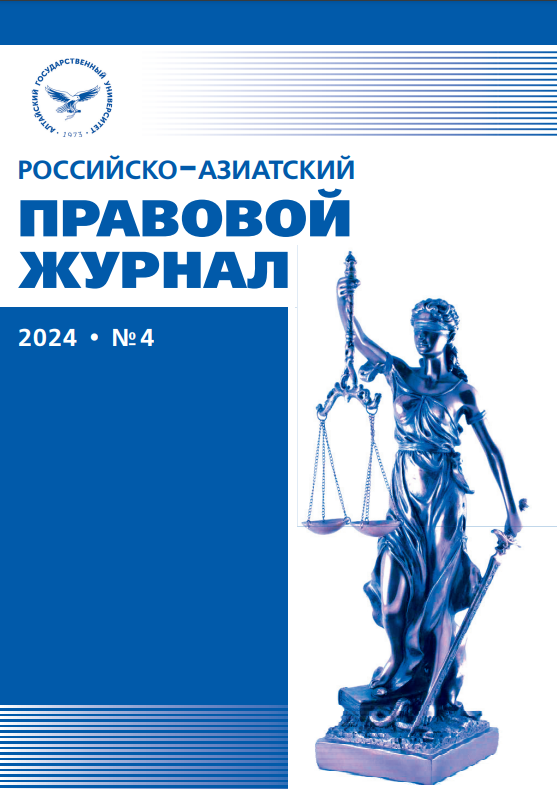THE WORK OF COORDINATION CENTERS ON THE ISSUES OF FORMING AN ACTIVE CIVIC POSITION IN YOUTH, PREVENTING INTER-NATIONAL AND INTER-CONFESSIONAL CONFLICTS, COUNTERING THE IDEOLOGY OF TERRORISM AND PREVENTION OF EXTREMIS MA ON THE BASE OF UNIVERSITIES
УДК 347:349.2 ББК 67.405.02
Abstract
The article substantiates the need to adjust the program documents of coordination centers operatingat universities. The author draws attention to the importance of forming a scientific and methodological base for coordination centers that currently operate without scientific support. The staff of the coordinationcenter, according to the Standard Regulations, includes a psychologist, however, taking into account thespecifics of the activities of the coordination center, namely, work in the field of countering the ideology ofterrorism, extremism, and other destructive ideologies, it is worth involving professional lawyers or teachersof legal disciplines in the staff, as well as criminologists. The author emphasizes that the development ofrecommendations for improving preventive work in such a specific area cannot be carried out withoutthe participation of competent specialists, who are often not included in the staff of coordination centers.Without a detailed study of the audience, preventive measures are reduced to formalism and a pile ofmeaningless reporting.Also, as the author points out, adjustments are required to the annually approved standard electronicpassport of the coordination center's work. Typical provisions include the organization of advanced trainingcourses in the field of prevention of terrorism and extremism, interethnic and interfaith conflicts, andthe same preventive measures, however, this is not enough for a holistic system. It is necessary to specifyactivities and strengthen regional specificity in the work of coordination centers in order to fully unleashtheir significant criminological potential. And for this, first of all, it is necessary to attract young people,cultivate activists under the auspices of coordination centers, and form them into public opinion leaders inthe university and the region.
Downloads
References
Методические рекомендации по организации профилактической работы в образовательных организациях высшего образования, реализуемых в рамках учебного процесса, а также общевоспитательных, патриотических и досуговых мероприятий / под общ. ред. С.А. Чурилова. М. : Ростов-наДону, 2022.
Об основах системы профилактики правонарушений в Российской Федерации: Федеральный закон от 23.06.2016 №182-ФЗ // Справ.-правовая система «КонсультантПлюс». URL: http://www. consultant.ru.
Типовое положение о координационном центре по вопросам формирования у молодежи активной гражданской позиции, предупреждения межнациональных и межконфессиональных конфликтов, противодействия идеологии терроризма и профилактики экстремизма, разработанное Департаментом государственной молодежной политики и воспитательной деятельности Минобрнауки РФ //Справ.-правовая система «КонсультантПлюс». URL: http://www.consultant.ru.
О некоторых вопросах судебной практики по уголовным делам о преступлениях террористической направленности: Постановление Пленума Верховного Суда РФ от 09.02.2012 №1. URL: http://www.consultant.ru.
Абисова К.С. Детерминация и предупреждение террористической деятельности: дис. … канд. юрид. наук. Краснодар, 2023.
Уголовный кодекс Российской Федерации от 13.06.1996 №63-ФЗ. URL: http://www.consultant.ru.
Ковлагина Д.А. Актуальные проблемы квалификации и применения ст. 205.2 УК РФ // Пробелы в российском законодательстве. 2020. №5. С. 154–156.
О судебной практике по уголовным делам о преступлениях экстремистской направленности: Постановление Пленума Верховного Суда РФ от 28.06.2011 N 11 (ред. от 28.10.2021). URL: http://www.consultant.ru.
Шибзухов 3. А. Проблемы квалификации публичных призывов к осуществлению террористической деятельности или публичного оправдания терроризма, совершенных в соучастии // Общество и право. 2011. №2.
Бушмин С.И., Москалев Г.Л. Комментарий к уголовному законодательству о противодействии террористической и экстремистской деятельности : монография. Красноярск: Сиб. федер. ун-т, 2018.
Преступления террористической направленности: сравнительные аспекты: учебное пособие / под ред. И.А. Анисимовой, В.А. Мазурова. Барнаул: Изд-во Алт. ун-та, 2021.
Copyright (c) 2024 М.А. Стародубцева

This work is licensed under a Creative Commons Attribution 4.0 International License.
Russian-Asian Law Journal is a golden publisher, as we allow self-archiving, but most importantly we are fully transparent about your rights.
Authors may present and discuss their findings ahead of publication: at scientific conferences, on preprint servers, in public databases, and in blogs, wikis, tweets, and other informal communication channels.
Russian-Asian Law Journal allows authors to deposit manuscripts (currently under review or those for intended submission) in non-commercial, pre-print servers such as ArXiv.
Authors who publish with this journal agree to the following terms:
- Authors retain copyright and grant the journal right of first publication with the work simultaneously licensed under a Creative Commons Attribution License that allows others to share the work with an acknowledgement of the work's authorship and initial publication in this journal.
- Authors are able to enter into separate, additional contractual arrangements for the non-exclusive distribution of the journal's published version of the work (e.g., post it to an institutional repository or publish it in a book), with an acknowledgement of its initial publication in this journal.
- Authors are permitted and encouraged to post their work online (e.g., in institutional repositories or on their website) prior to and during the submission process, as it can lead to productive exchanges, as well as earlier and greater citation of published work (See The Effect of Open Access).








